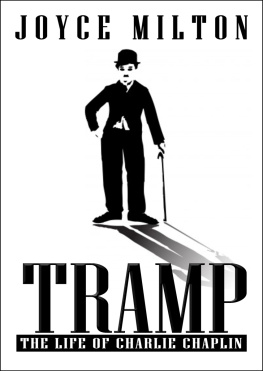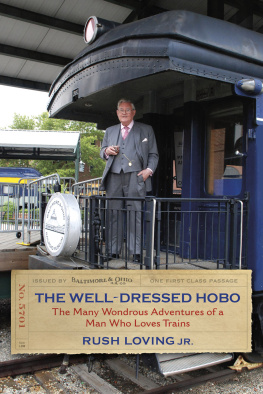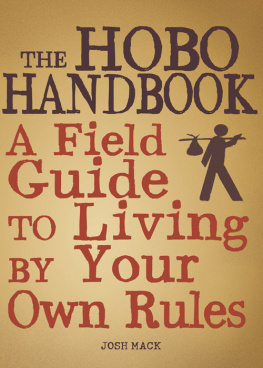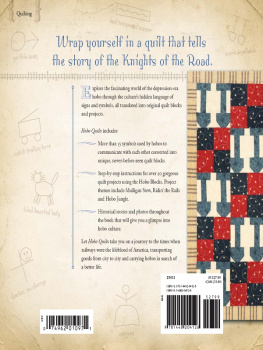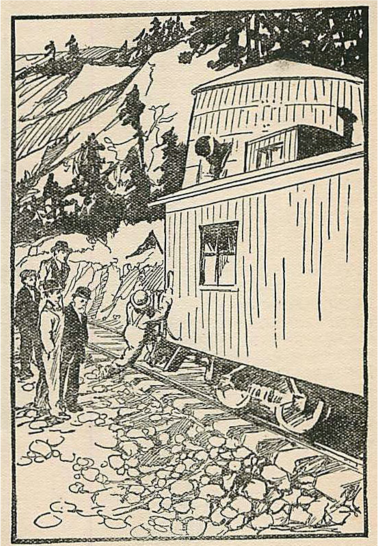CHAPTER I.
Left at the Water Tank.
S HE is off, Boys! We are good for Clarksburg! Just in time to hustle a hot supper! These were the words that a tramp whispered to the rest of us, who were hiding in the dark recesses of a closed, but empty box car on a Baltimore & Ohio freight train, that had just filled its engine tender at a lone water tank in the wildest region of the Alleghenies, as he heard the hissing sound of the escaping compressed air beneath our carthe certain sign that the engineer had released the automatic air-brakes preparatory to leaving the water tank.
But this tramp had reckoned without our host. Barely had he uttered these words so cheering to us, who had been riding in this same box car, without a bite of food, since early in the morning, than the large side door was jerked open and the grimy visage of a brakeman made its appearance. Scanning the interior and espying some figures slinking away into the darkest corners, he swung into the car, and as the train was pulling out, ordered us, with this rough command, to vacate the side-door Pullman: Hit the grit, you hoboes, and be quick about it! Do you think this is an accommodation train run for the benefit of bums and dead-heads?
We complied as quickly as possible with his demand, and while we were jumping to the ground, he continued his rough talk: Do you Bos think the B. & O. is running tramp trains for your kind? Where did you guys figure you were going to bo this train anyhow?
To this query an old patriarchal looking fellow, last one of us in the car, volunteered the information: that we were out of work and bound for the harvest fields of North Dakota!
This innocent reply aroused the ire of the trainman, who grabbed the old fellow by the coat collar and roughly pushed him off the moving train to the ground, at the same time shouting: What crazy hoboes are you anyhow, bound in the middle of July to the October harvest of the West?
He must have heard us others giggling at the comical answer the patriarch had handed him, for while he slammed the car door shut and was locking it, he plainly showed his wrath as he snarled: You hoboes think you are wise ones, and believe you can hand such bum talk to a wise brakeman as I am, eh? You are too confounded smart! You stay right here at this water tank, or I will know the reason why!
The train was gaining speed as the angry railroader stood scowling before us, and to prevent us from swinging under the cars to ride upon the rods or brakebeams, he watched our every move until the tail end with the caboose passed, when he swung upon its rear platform; then he quickly turned, and waving his clenched fist at us he shouted back: Nixie place this! Nixie place this! Nothing stops here!
This is how it happened that we were left behind at a lone water tank in the wildest section of the Alleghenies of West Virginia; we, that is, four of usthe patriarchal old gentleman, who must have reached the three score and ten allotment of years, a tall, wary-faced fellow of perhaps thirty-seven, a boy of about seventeen and myself.
When the tail end of the train with the caboose passed, he swung upon its rear platform, and we were left behind.
After the train had rumbled around the curve and out of view, the old fellow was the first to speak: Its no use fellows, to complain about spilled milk. This he said to encourage us, and as we others had not a remark to make, as we mightily felt the missing of our supper at the very last moment, he continued: Its not only too bad that we have lost a good ride, but what is worse, we are ditched in the hungriest territory hereabouts, for we might as well have been fired off in a desert, as I know the B. & O. like a map, having rambled over her so often, and I can tell you that we are about twenty-eight miles from Clarksburg, with just two lone section houses between here and there which have been bummed to death, and it is twenty miles back again to Grafton, where one of those B. & O detectives is just dying to catch hoboes, because yeggs have blown some safes down there lately, and at the present he is fierce on anything in the hobo-line.
This was the very discouraging road news he gave, and to us hungry castaways it was so disheartening that we made no objections when the old fellow proposed that we build a campfire, and wait here at this lone water tank for the next train to stop to take us to our destination. Suiting action to his proposal he turned to me and asked: Say, Bo, got a match? I handed him a few, and with him leading and the rest of us meekly following, we made our way to an adjacent pine thicket, where among the tall trees we soon had a brisk campfire burning, while the darkness of the approaching night settled over the mountains.
CHAPTER II.
The Unwritten Code of the Road.
B EFORE I proceed with the actual story, I shall explain several of the peculiar traits and usages in vogue among wandering tramps, which, as they have never hitherto appeared in print, will make the uninitiated reader better understand many passages in this booklet.
There is a wide difference between the insolent, begging drunkard commonly called tramp by the press, and the inveterate wanderer, who, from the day he leaves his home or employment to become a confirmed rover, to the day when the earth covers his rough pine board coffin, is a victim of an irresistible urging to keep constantly on the movea malady so well designated in the German language as the Wanderlust.
One of the peculiarities of this roving class of tramps isstrange as this may appear to the uninitiated outsiderthat in their intercourse amongst themselves they are governed by a code, whose unwritten laws and rules are far more observed to by the tramps, than these obey the, to them, irksome laws codified by society.
Tramps not only have a complete set of laws, which as mentioned before, have never been written down nor even tabulated, but also have a full set of signs, designated to convey information concerning the police, the jails, and other matters pertaining to the welfare of the members of their widely scattered unorganized clan, of which I give upon the following pages a complete chart and a key to their meaning.
***
A Key to the Chart of Signs used by Tramps
1. A tramps complete monicker showing his road-name, the date and direction of his travel.
2 through 5. Arrows pointing and indicating the route and the direction the tramp is rambling.
6. The tramp indicates that he intends to go across the country upon a country road.
7. The tramp indicates that he is still in town waiting for the party whose name is written below this sign.
8. The police in this place are dead easy.
9. The police in this place are strictly hostile.
10. There is a railroad detective here, but he is a good fellow.
11. There is a strictly hostile railroad detective here. Look out!
12. This sign on a fence, post, door, etc., means good people reside here.
13. This sign means: People residing here do not give.
14. This sign means: There is a cranky woman or bad bulldog here.
15. This sign means: There is a cross man or bad dog here.
16. The Jail here is sanitary and prisoners are well fed.
17. The Jail here is sanitary, but they starve their prisoners.
18. The Jail here is vermin infested.
19. The Jail here is unsanitary, and from it contagious diseases are spread all over the United States.
20. This town has a rock pile.
21. This town has a workhouse.
22. This town has saloons.
23. This is a prohibition town.


